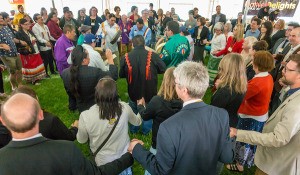
Yesterday, Chancellor Doug Stollery and I were honoured to be signatories to a memorandum of understanding between the University of Alberta and the National Centre for Truth and Reconciliation. The signing marks a significant step forward in our For the Public Good commitment to respond to the Calls to Action of the Truth and Reconciliation Commission.
Along with Ry Moran, executive director of the NCTR, the MOU was by signed by Gordon Burnstick (Elder; Residential School Survivor), Jerry Saddleback (Elder; Residential School Survivor), Elmer Ghostkeeper (Métis Elder), Marilyn Buffalo (Cultural Advisor, University of Alberta; Residential School Suvivor), and Mary Moonias (Elder; Residential School Survivor). We cannot move forward with our commitments without honouring, respecting and partnering with survivors and Indigenous communities.
The signing was celebrated with a special ceremony that brought together survivors, members of the University of Alberta leadership team and community, our Indigenous community partners, and government leaders and representatives. Together, we re-affirmed that the University of Alberta must be an active partner in telling and sharing the history of Indian Residential Schools, and in doing so, continue to work towards reconciliation based on a shared understanding of the historical and ongoing impacts of colonization.
Located at the University of Manitoba, the National Centre for Truth and Reconciliation is the permanent home of the stories, statements, documents and other materials gathered by the Truth and Reconciliation Commission. Its mandate is to ensure that these valuable collections are available and accessible to all, in accordance with protocols developed by the survivors. In signing the MOU, the University of Alberta will help to build the centre’s archives and promote broad access; facilitate research, oral history, and community narratives; and support public education and reconciliation activities. It also creates a framework for other activities at the university that we put in place to continue our work in developing a meaningful, reciprocal, and sustainable response to the TRC Calls to Action.
I would like to thank everyone who joined together to witness this agreement, and as active participants in reconciliation. Together with our Indigenous community partners, we can continue to move forward on the path to reconciliation.
David H. Turpin
President and Vice-Chancellor